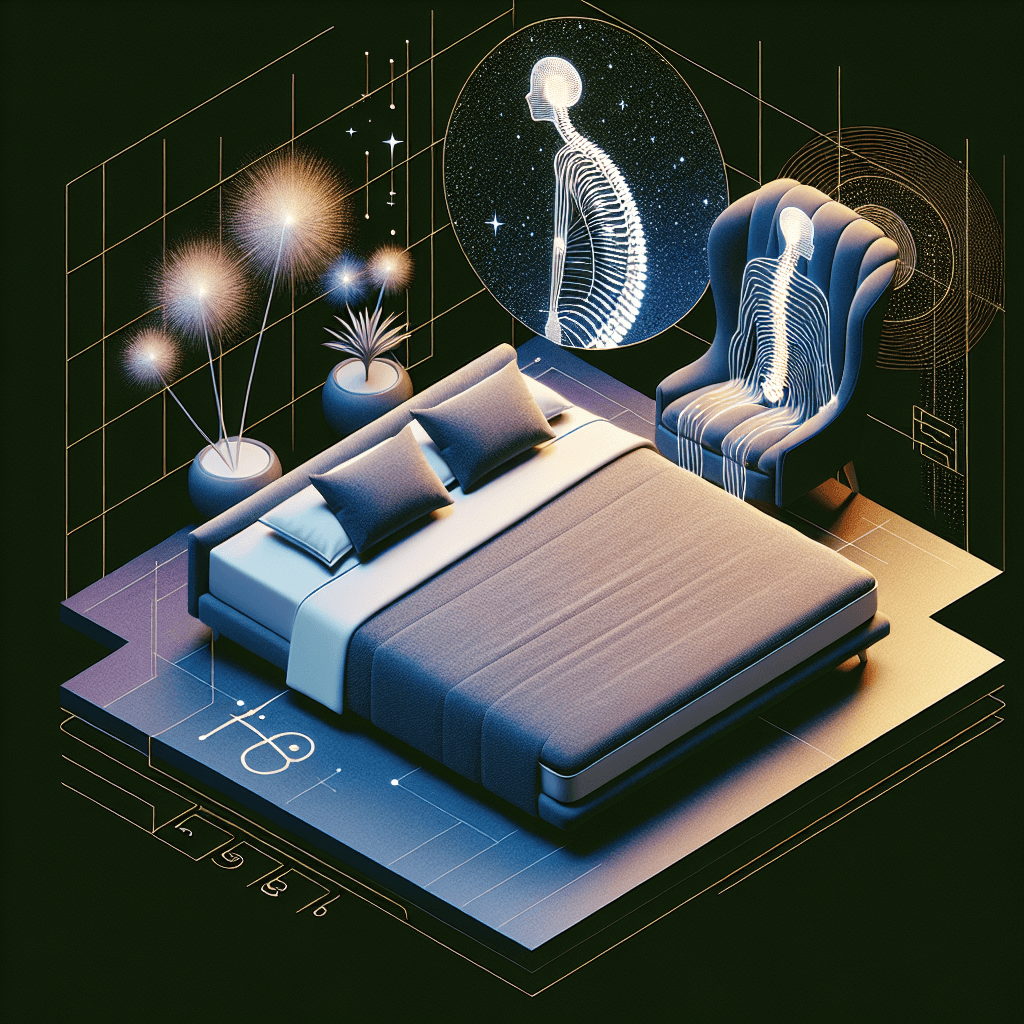Introduction: Understanding the Impact of Right Hip Pain on Sleep
Do you experience persistent right hip pain at night that disrupts not only your sleep but also your daily life? You are not alone. Although nighttime hip pain may seem harmless, it profoundly impacts the quality of your sleep and, by extension, your overall health.
Objectives of the Article
This article explores why right hip pain at night can affect your sleep and offers effective ways to manage it. We'll look at the possible causes of this pain, how it affects sleep, possible medical diagnoses, treatment options, and lifestyle changes to adopt for lasting relief.
Part 1: Common Causes of Right Hip Pain at Night
Identifying the Causes of Hip Pain at Night
Osteoarthritis and its Impacts
Osteoarthritis is a common source of hip pain, especially at night. It results from wear and tear on the cartilage, leading to painful inflammation. According to the Arthritis Foundation, osteoarthritis can make it difficult to move and cause nighttime pain that disrupts sleep [Arthritis Foundation, 2023].
- Keywords to include: right hip osteoarthritis, inflammatory pain
Hip Bursitis
Bursitis is inflammation of the bursa, a small fluid-filled sac that cushions bones, tendons, and muscles near joints. Symptoms include sharp pain at night, often exacerbated by prolonged pressure on the hip [Mayo Clinic, 2023].
- Keywords to integrate: hip bursitis at night, bursal pain
Tendonitis and Muscle Pain
Tendonitis results from overuse of the tendons, which can disrupt sleep alignments. This condition causes a dull or sharp pain that often occurs at night, making it difficult to sleep comfortably.
- Keywords to include: right hip tendonitis, night tendon pain
📌 To Remember:
- Identifying specific causes is crucial for targeted treatment.
- Osteoarthritis and bursitis are common causes of nighttime pain.
- Tendinitis due to overuse also affects sleep.
Part 2: Effects of Hip Pain on Sleep
How Pain Affects Sleep Quality
Sleep Stages Disturbed by Pain
Chronic pain negatively influences deep sleep phases , which are crucial for physical recovery. Studies show that pain interferes with sleep architecture, reducing the time spent in deep sleep [Pain and Sleep Studies, 2023].
- Keywords to include: disturbed sleep, sleep phases
Insomnia and Chronic Fatigue
Hip pain is a common cause of insomnia , leading to chronic fatigue that affects mental and physical health. Lack of restful sleep increases the perception of pain, creating a vicious cycle.
- Keywords to integrate: hip insomnia, chronic fatigue
Sleeping Position and Pain
How you sleep can influence the pain you feel. Poor sleeping positions can exacerbate pain, while a good mattress and ergonomic pillows can provide significant relief.
- Keywords to integrate: sleeping position pain, body alignment
📌 To Remember:
- Pain disrupts essential deep sleep phases.
- Insomnia and fatigue are often consequences of lack of restorative sleep.
- Choosing the right sleeping position and bedding can reduce pain.
Part 3: Medical Diagnosis and Evaluations
Getting an Accurate Diagnosis of Hip Pain
Medical Consultations and Examinations
For an accurate diagnosis, X-rays and MRIs are often necessary. They help identify osteoarthritis, bursitis, or other underlying conditions [Medical Protocols, 2023].
- Keywords to include: hip pain diagnosis, imaging examination
Drug and Non-Invasive Treatments
Painkillers and anti-inflammatories are common treatments. In addition, physical therapies such as physiotherapy offer effective non-invasive solutions.
- Keywords to include: hip pain treatment, non-surgical options
Consult a Specialist
Rheumatologists and orthopedists play key roles in hip pain management. Their expertise is essential to developing a personalized treatment plan.
- Keywords to include: hip specialist, professional treatment
📌 To Remember:
- An accurate diagnosis often requires imaging tests.
- Treatments include medications and physical therapies.
- Consulting a specialist is crucial for personalized treatment.
Part 4: Solutions and Therapies for Pain Relief
Strategies to Relieve Hip Pain and Improve Sleep
Targeted Exercises and Stretches
Specific exercise programs and yoga can improve flexibility and reduce pain. Clinical studies have shown that these approaches significantly decrease discomfort [Impact of Exercise on Hip Pain, 2023].
- Keywords to include: hip exercises, pain stretching
Bedding Adaptations
Choosing the right mattress and pillows can make a big difference. Orthopedic bed accessories provide extra support to optimize sleeping comfort.
- Keywords to include: orthopedic bedding, sleeping comfort
Natural Pain Management
Essential oils and medicinal herbs offer natural solutions. Acupuncture and massage are also beneficial holistic approaches.
- Keywords to include: natural pain management, alternative methods
Recommended Products:
- Flaxseed Heating Pad : ideal for providing warmth and relaxation【4:5†source】.
- Memory Foam Cotton Leg Pillow : Optimal Support to Reduce Pain【4:6†source】.
📌 To Remember:
- Targeted exercises can reduce pain and improve mobility.
- The right bedding can significantly improve nighttime comfort.
- Natural methods offer integrated management solutions.
Part 5: Lifestyle Habits and Preventive Practices
Prevention and General Well-Being
Active and Healthy Lifestyle
Adopting moderate physical activity and a balanced diet can reduce inflammation. A healthy lifestyle is essential to prevent and manage chronic pain.
- Keywords to include: healthy lifestyle, anti-inflammatory diet
Relaxation and Stress Management Techniques
Meditation and stress management techniques can reduce the perception of pain and improve quality of life.
- Keywords to integrate: relaxation techniques, stress management
Regular Monitoring and Continuous Adjustments
Regular medical monitoring allows treatments to be adjusted based on progress. Adapting therapeutic techniques is crucial for lasting relief.
- Keywords to include: medical pain monitoring, therapeutic adjustments
📌 To Remember:
- A healthy lifestyle reduces inflammation and pain.
- Relaxation techniques help manage stress and pain.
- Regular monitoring and ongoing adjustments are essential for effective relief.
Conclusion: Ensure Peaceful Sleep Despite Hip Pain
Right hip pain at night can be effectively addressed with proper diagnostics, targeted treatments, and lifestyle changes. Adopt strategies to minimize pain and improve the quality of your sleep in the long term. Consult a healthcare professional for an accurate diagnosis and begin your personalized pain management plan today.
FAQ: Frequently Asked Questions About Hip Pain at Night
-
Why does my right hip hurt at night?
- Causes may include osteoarthritis, bursitis, and tendonitis. It is important to consult a doctor for an accurate diagnosis.
-
How does hip pain at night affect sleep?
- It disrupts deep sleep phases, leading to insomnia and chronic fatigue.
-
What exercises can help relieve hip pain?
- Specific exercises and yoga can reduce pain and improve flexibility.
-
When to see a doctor for nighttime hip pain?
- If pain is disrupting your daily life, it is crucial to consult a specialist.
-
What bedding adaptations do you recommend for hip pain?
- An orthopedic mattress and pillows can significantly improve nighttime comfort.
-
Are there any natural remedies for hip pain?
- Essential oils, acupuncture, and massages are effective natural methods.
Adopt these tips to improve your well-being and promote restful sleep despite hip pain.





